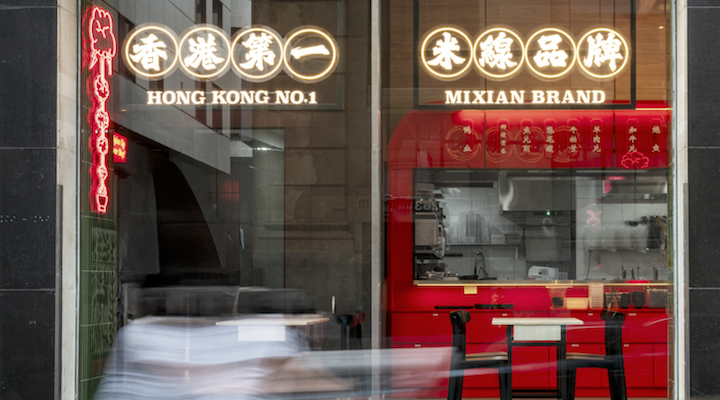Hong Kong-listed restaurant operator Tam Jai International (TJI) has opened its first Australian restaurant and overseas franchised outlet in Melbourne’s Swanston Street, in partnership with ST Group Food Industries Holdings. The move marked TJI’s foray into the Western and overseas market expansion through partnership models. “Australia is close to Asia and has a very high acceptance of Asian food as well as a spectacular food scene,” Daren Lau, chairman, executive director and CEO
EO of TJI, told Inside Retail.
“There are also lots of Asian and Chinese ethnic groups, contributing to a special blend of Australian and Asian food cultures. This makes Australia a unique location for TJI to explore the Western market, thanks to its high acceptance and sophistication of Asian food, as well as its role as a good melting pot for us to adapt to the Western culture.”
The company aims to expand into the broader Western market, including the UK, Europe, the US and Canada.
“This adaptation will help us refine our model to better fit Western cultural preferences. In addition, compared with other Western markets, Australia is in a time zone that is much closer to Hong Kong, allowing us to provide better support,” he added
Listed since October 2021, TJI’s portfolio of brands includes TamJai Yunnan Mixian, TamJai SamGor Mixian, and the Japanese dining brands, Marugame Seimen and Yakiniku Yamagyu, through franchise and licensing in Hong Kong.
TJI operates more than 240 stores across various markets, including Mainland China, Singapore, Japan and Australia.
Melbourne launch
“Melbourne was chosen mainly because our partner ST Group is headquartered there and has its central kitchen, warehouse and logistics centre in the city,” Lau said.
“In addition, we found Melbourne’s food scene exciting, and its central business district (CBD) has a very good mix of business people, leisure visitors and a large number of university students, many of whom are Asian or Chinese. This creates a perfect environment for our market entry.”
Operated under the brand name ‘TamJai Mixian’, the new 123-square-metre store in Melbourne’s central business district near Chinatown can seat up to 42 customers. Its prime location is expected to draw a diverse customer base, benefiting from both high foot traffic and the area’s large Chinese communities.
“We have established standardised processes in our operations, which have been manualised to enable quick and consistent preparations across different units,” Lau said.
“These standardised procedures cover supply chain, food processing, restaurant management, customer service, cleaning, staff training and quality control. This helps ensure consistency in the quality of our food and service while enhancing operational and management efficiency.”
He added to maintain consistency in quality and service across locations as the brand grows internationally, the company also provides standardised training and certifications to trainees to ensure restaurants are run by qualified operators.
“Our investment in digital transformation, including our point-of-sales (POS) system, supply chain management system and other back-of-the-house systems, also helps us maintain consistency as we expand our operations internationally,” he said.
Strategic partnership
Lau said TJI needs a strong local partner in the Australian market who is professional in the food and beverage industry and understands the local regulations, business environment, customer habits and tastes, and competition very well.
“After our study of the Australian market, we recognise that operating restaurants there is very different from that in Hong Kong. Various aspects, such as landlords, builders, regulations, practices, employee rules, customer habits, supply chain and franchise laws, vary a lot between the two locations. Partnering with an experienced local operator through a joint venture can provide us with all the local know-how and networks, which will help us navigate many of the challenges of entering a new country,” he said.
“Given the very high running costs in Australia, making mistakes in this market can be very costly and a joint venture partner can help us mitigate these risks.”
Headquartered in Australia, ST Group holds exclusive franchise and licence rights to a portfolio of 10 international brands, including Ippudo, Gong Cha, PappaRich, Nene Chicken, and Hokkaido Baked Cheese Tart. The company has a network of 178 outlets across Australia, New Zealand, and the United Kingdom as of 30 June.
TJI said it will not directly operate any stores in Australia in the near future.
“The Australian market is quite fragmented, with different states and neighbourhoods. It is best to utilise a franchise model to expand our restaurant network as each franchisee has their own local knowledge and network to penetrate into the right area for business,” Lau said.
“Franchising is a common model in the Western market, which takes the merits of a brand’s successful operating model and applies it to the local area.”
International expansion
In Australia, the company is focusing on developing its business in cities such as Melbourne and Sydney, which have larger Asian populations and a higher demand for Asian cuisine.
“In our first phase of development, we plan to open a total of two to three restaurants in Melbourne by the end of March 2025, followed by the expansion to Sydney in the next stage. The group looks forward to opening between 20 and 30 outlets in Australia in the next few years,” he said.
Lau added the company is currently working with its partners in Malaysia and the Philippines to expand into these two countries, with the first store openings scheduled for next year.
“TJI is also in discussions with some partners for entering other markets, and relevant updates will be announced in due course,” he said.







